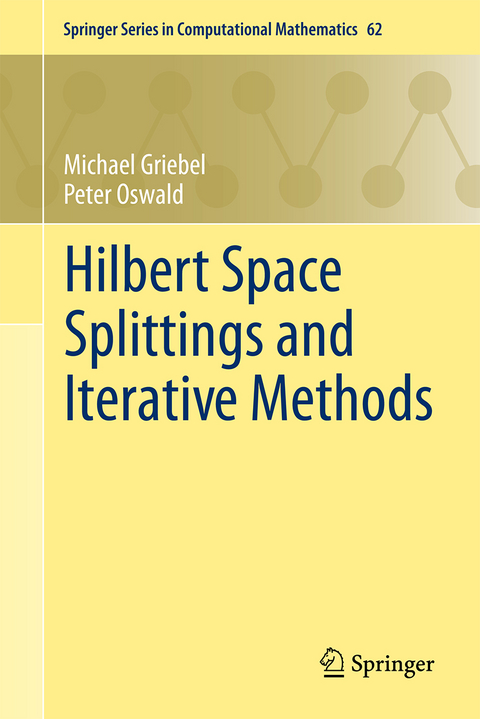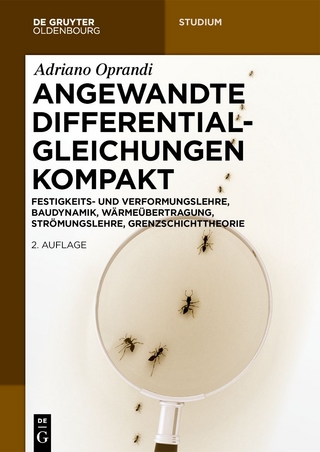
Hilbert Space Splittings and Iterative Methods
Springer International Publishing (Verlag)
9783031743696 (ISBN)
This book is about the theory of so-called Schwarz methods for solving variational problems in a Hilbert space V arising from linear equations and their associated quadratic minimization problems. Schwarz methods are based on the construction of a sequence of approximate solutions by solving auxiliary variational problems on a set of (smaller, finite-dimensional) Hilbert spaces $V_i$ in a certain order, combining them, and using the combined approximations in an iterative procedure. The spaces $V_i$ form a so-called space splitting for V, they need not necessarily be subspaces of V, and their number can be finite or infinite.
The convergence behavior of Schwarz methods is influenced by certain properties of the space splittings they are based on. These properties are identified, and a detailed treatment of traditional deterministic and more recent greedy and stochastic orderings in the subproblem solution process is given, together with an investigation of accelerated methods. To illustrate the abstract theory, the numerical linear algebra analogs of the iterative methods covered in the book are discussed. Its standard application to the convergence theory of multilevel and domain decomposition methods for solving PDE problems is explained, and links to optimization theory and online learning algorithms are given.
Providing an introduction and overview of iterative methods which are based on problem decompositions and suitable for parallel and distributed computing, the book could serve as the basis for a one- or two-semester course for M.S. and Ph.D. students specializing in numerical analysis and scientific computing. It will also appeal to a wide range of researchers interested in scientific computing in the broadest sense.
Michael Griebel received his education at the Technical University of Munich, Germany. He is a professor at the Institute for Numerical Simulation at the University of Bonn, Germany, where he holds the Chair of Scientific Computing and Numerical Simulation. Additionally, he is the director of Fraunhofer SCAI (Institute for Algorithms and Scientific Computing), Sankt Augustin, Germany. His research interests include numerical simulation, scientific computing, machine learning, and high-dimensional approximation. Since 2002, he has served as the Editor-in-Chief of the Springer journal Numerische Mathematik.
Peter Oswald received his education at Odessa State University and Moscow State University. He has held research, teaching, and professorship positions at various institutions, including TU Dresden, FSU Jena, Kuwait University, Texas A&M University, Bell Laboratories, Jacobs University Bremen, and the University of Bonn. His research interests include approximation theory, function spaces, and numerical analysis.
1 Introduction.- 2 Hilbert space splittings: Abstract theory.- References.- 3 Hilbert space splittings: Examples and extensions.- References.- 4 Schwarz iterative methods: Finite Omega.- References.- 5 Special topics and extensions.- References.- 6 Schwarz approximation methods: Infinite Omega.- References.- 7 Applications to PDE solvers.- References.- A Hilbert space basics.- A.1 Spaces: Basic notation, definitions and properties.- A.2 Operators between Hilbert spaces.- A.3 Linear equations and variational problems.- A.4 Constructions on Hilbert spaces.- A.5 Sobolev spaces on domains.- A.6 Reproducing kernel Hilbert spaces (RKHS).- References.- Index.
| Erscheinungsdatum | 08.11.2024 |
|---|---|
| Reihe/Serie | Springer Series in Computational Mathematics |
| Zusatzinfo | IX, 440 p. 1 illus. in color. |
| Verlagsort | Cham |
| Sprache | englisch |
| Maße | 155 x 235 mm |
| Themenwelt | Mathematik / Informatik ► Mathematik ► Analysis |
| Mathematik / Informatik ► Mathematik ► Wahrscheinlichkeit / Kombinatorik | |
| Schlagworte | deterministic algorithms • Greedy algorithms • Hilbert Space Splittings • iterative methods • Stochastic algorithms |
| ISBN-13 | 9783031743696 / 9783031743696 |
| Zustand | Neuware |
| Informationen gemäß Produktsicherheitsverordnung (GPSR) | |
| Haben Sie eine Frage zum Produkt? |
aus dem Bereich


